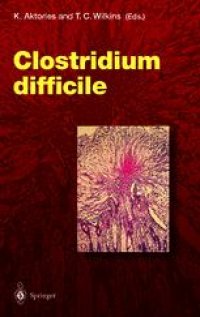
Ebook: Clostridium difficile
Author: J. S. Brazier S. P. Borriello (auth.) Professor Dr.Dr. Klaus Aktories Dr. Tracy D. Wilkins (eds.)
- Tags: Microbiology, Pharmacology/Toxicology, Cell Biology, Molecular Medicine
- Series: Current Topics in Microbiology and Immunology 250
- Year: 2000
- Publisher: Springer-Verlag Berlin Heidelberg
- Edition: 1
- Language: English
- pdf
Clostridium difficile has been recognized as the cause of a broad spectrum of enteric disease ranging from mild antibiotic-associated diarrhea to pseudomembranous colitis. This volume gives new insights into the microbiology, diagnostics and epidemiology of Clostridium difficile and describes recent strategies in treatment of diseases caused by this agent. Main parts of the volume are devoted to Clostridium difficile toxins A and B which are the major virulence factors. The molecular biology, biochemistry, pharmacology and cell biology of these toxins which are the prototypes of a new family of large clostridial cytotoxins is described in great detail. Clostridium difficile toxins act as glucosyltransferases to inactivate small GTP-binding proteins of the Rho family which are involved in regulation of the actin cytoskeleton, cell adhesion and various signaling processes.
Clostridium difficile has been recognized as the cause of a broad spectrum of enteric disease ranging from mild antibiotic-associated diarrhea to pseudomembranous colitis. This volume gives new insights into the microbiology, diagnostics and epidemiology of Clostridium difficile and describes recent strategies in treatment of diseases caused by this agent. Main parts of the volume are devoted to Clostridium difficile toxins A and B which are the major virulence factors. The molecular biology, biochemistry, pharmacology and cell biology of these toxins which are the prototypes of a new family of large clostridial cytotoxins is described in great detail. Clostridium difficile toxins act as glucosyltransferases to inactivate small GTP-binding proteins of the Rho family which are involved in regulation of the actin cytoskeleton, cell adhesion and various signaling processes.
Clostridium difficile has been recognized as the cause of a broad spectrum of enteric disease ranging from mild antibiotic-associated diarrhea to pseudomembranous colitis. This volume gives new insights into the microbiology, diagnostics and epidemiology of Clostridium difficile and describes recent strategies in treatment of diseases caused by this agent. Main parts of the volume are devoted to Clostridium difficile toxins A and B which are the major virulence factors. The molecular biology, biochemistry, pharmacology and cell biology of these toxins which are the prototypes of a new family of large clostridial cytotoxins is described in great detail. Clostridium difficile toxins act as glucosyltransferases to inactivate small GTP-binding proteins of the Rho family which are involved in regulation of the actin cytoskeleton, cell adhesion and various signaling processes.
Content:
Front Matter....Pages i-ix
Microbiology, Epidemiology and Diagnosis of Clostridium difficile Infection....Pages 1-33
Genetics of Clostridium difficile Toxins....Pages 35-54
Molecular Mode of Action of the Large Clostridial Cytotoxins....Pages 55-83
Cytotoxic Effects of the Clostridium difficile Toxins....Pages 85-96
Large Clostridial Cytotoxins as Tools in Cell Biology....Pages 97-107
Pathogenesis and Clinical Manifestations of Clostridium difficile Diarrhea and Colitis....Pages 109-125
Treatment of Clostridium difficile-Associated Diarrhea and Colitis....Pages 127-139
Back Matter....Pages 141-146
Clostridium difficile has been recognized as the cause of a broad spectrum of enteric disease ranging from mild antibiotic-associated diarrhea to pseudomembranous colitis. This volume gives new insights into the microbiology, diagnostics and epidemiology of Clostridium difficile and describes recent strategies in treatment of diseases caused by this agent. Main parts of the volume are devoted to Clostridium difficile toxins A and B which are the major virulence factors. The molecular biology, biochemistry, pharmacology and cell biology of these toxins which are the prototypes of a new family of large clostridial cytotoxins is described in great detail. Clostridium difficile toxins act as glucosyltransferases to inactivate small GTP-binding proteins of the Rho family which are involved in regulation of the actin cytoskeleton, cell adhesion and various signaling processes.
Content:
Front Matter....Pages i-ix
Microbiology, Epidemiology and Diagnosis of Clostridium difficile Infection....Pages 1-33
Genetics of Clostridium difficile Toxins....Pages 35-54
Molecular Mode of Action of the Large Clostridial Cytotoxins....Pages 55-83
Cytotoxic Effects of the Clostridium difficile Toxins....Pages 85-96
Large Clostridial Cytotoxins as Tools in Cell Biology....Pages 97-107
Pathogenesis and Clinical Manifestations of Clostridium difficile Diarrhea and Colitis....Pages 109-125
Treatment of Clostridium difficile-Associated Diarrhea and Colitis....Pages 127-139
Back Matter....Pages 141-146
....